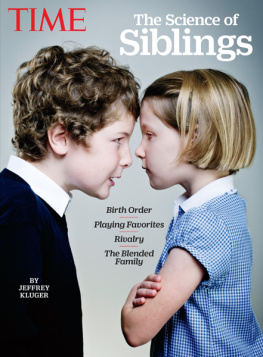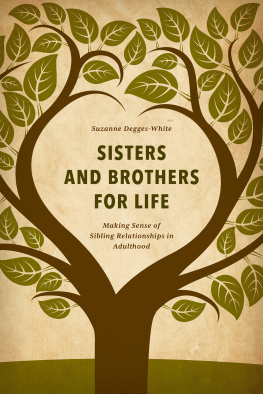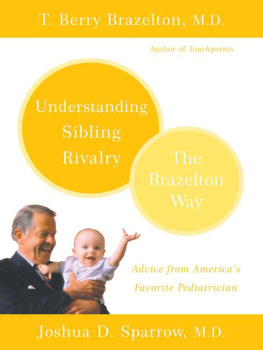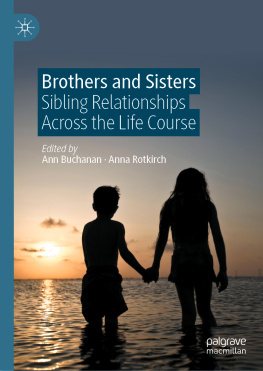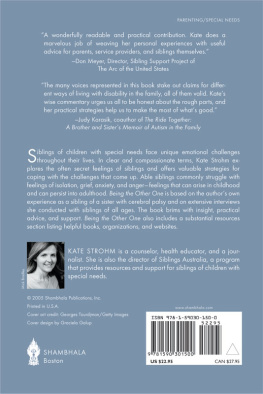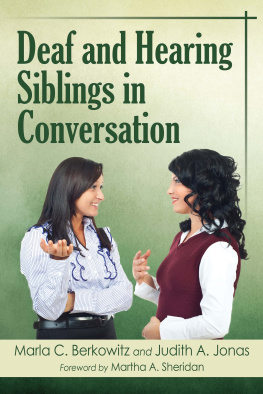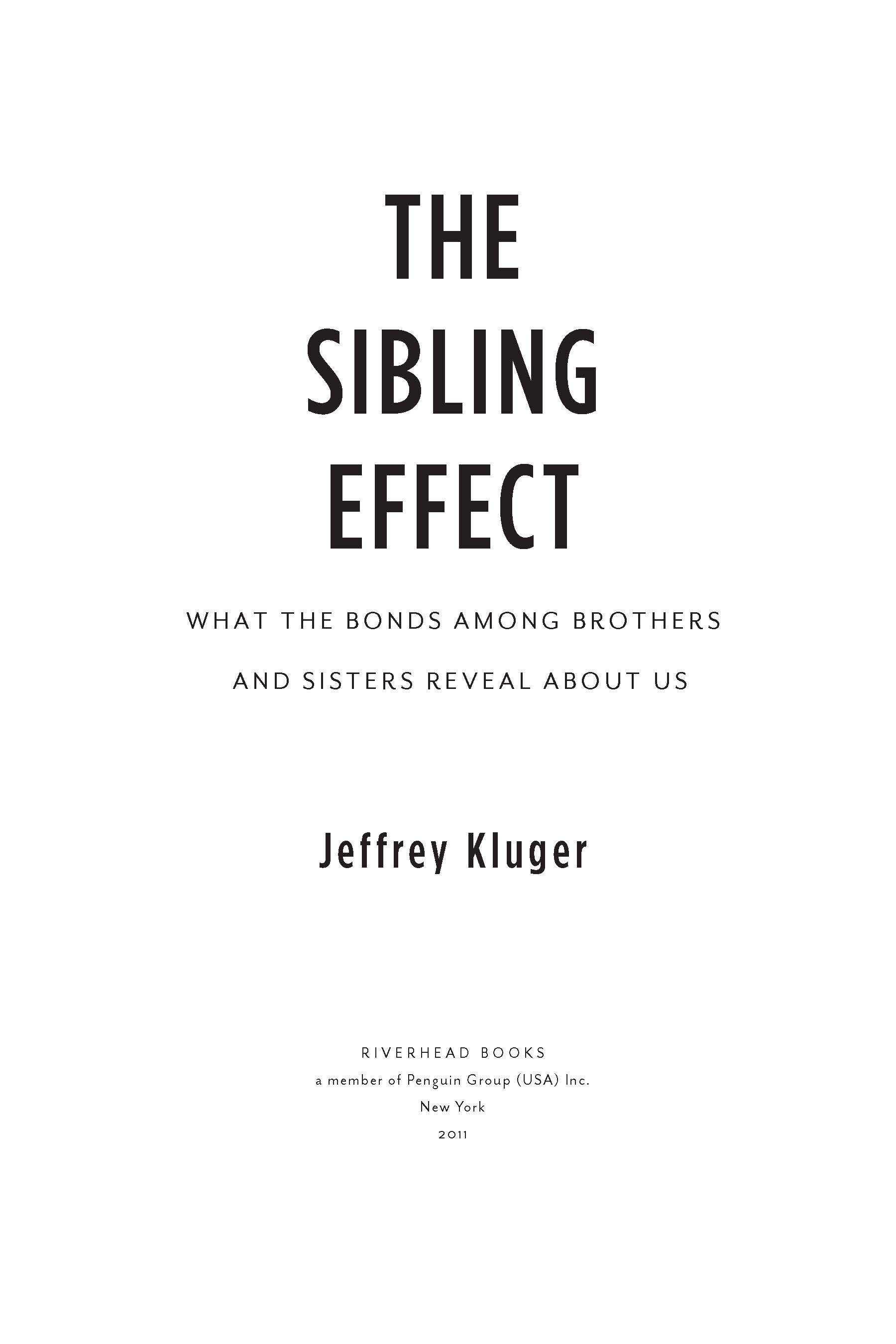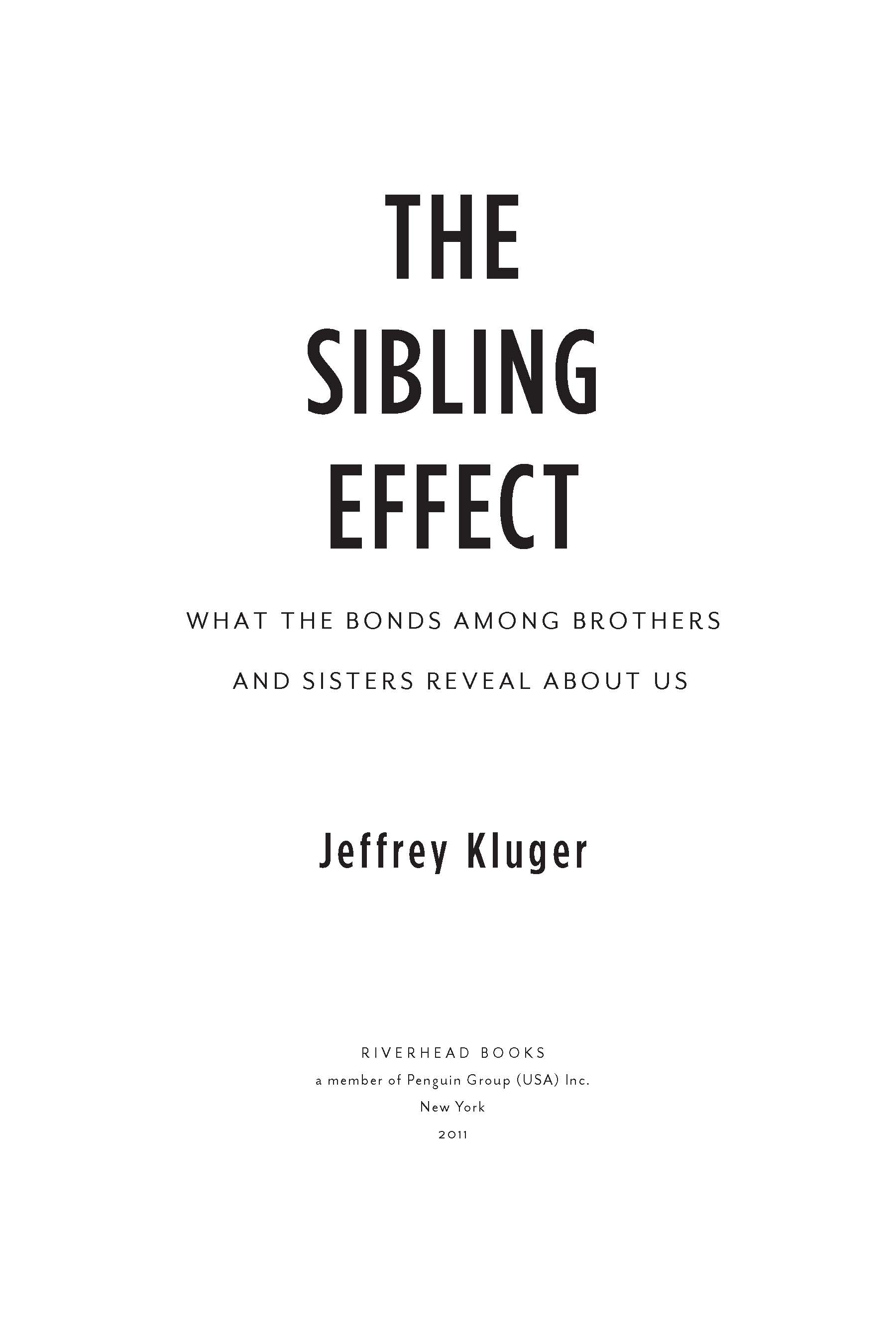Table of Contents
RIVERHEAD BOOKS
Published by the Penguin Group
Penguin Group (USA) Inc., 375 Hudson Street, New York, New York 10014, USA
Penguin Group (Canada), 90 Eglinton Avenue East, Suite 700, Toronto, Ontario M4P 2Y3, Canada
(a division of Pearson Penguin Canada Inc.) Penguin Books Ltd, 80 Strand, London WC2R 0RL, England
Penguin Ireland, 25 St Stephens Green, Dublin 2, Ireland (a division of Penguin Books Ltd)
Penguin Group (Australia), 250 Camberwell Road, Camberwell, Victoria 3124, Australia
(a division of Pearson Australia Group Pty Ltd) Penguin Books India Pvt Ltd,
11 Community Centre, Panchsheel Park, New Delhi110 017, India Penguin Group (NZ),
67 Apollo Drive, Rosedale, North Shore 0632, New Zealand (a division of Pearson New Zealand Ltd)
Penguin Books (South Africa) (Pty) Ltd, 24 Sturdee Avenue, Rosebank, Johannesburg 2196, South Africa
Penguin Books Ltd, Registered Offices: 80 Strand, London WC2R 0RL, England
Copyright 2011 by Jeffrey Kluger
All rights reserved. No part of this book may be reproduced, scanned, or distributed
in any printed or electronic form without permission. Please do not participate
in or encourage piracy of copyrighted materials in violation of the authors rights.
Purchase only authorized editions.
Published simultaneously in Canada
Library of Congress Cataloging-in-Publication Data
Kluger, Jeffrey.
The sibling effect : what the bonds among brothers and sisters reveal about us / Jeffrey Kluger.
p. cm.
ISBN : 978-1-101-54778-6
1. Brothers and sisters. 2. Interpersonal relations. 3. Parent and child. I. Title.
BF723.S43K
155.92dc22
While the author has made every effort to provide accurate telephone numbers and Internet addresses
at the time of publication, neither the publisher nor the author assumes any responsibility for errors,
or for changes that occur after publication. Further, the publisher does not have any control over
and does not assume any responsibility for author or third-party websites or their content.
http://us.penguingroup.com
With love to
Steve, Garry, Bruce, Adam, and Allison,
with whom Im sharing the ride
ONE
Band of Brothersand Sisters
At the time, it seemed like a good idea to put my baby brother Bruce in the fuse box. Technically speaking, it wasnt a fuse boxit was more of a fuse cabinet, something larger than a medicine chest and much deeper, made of the same 1950s knotty pine that covered the rest of our playroom. Technically speaking again, my brother wasnt a baby. He was four years oldbut to me, two years older than he was, that seemed pretty close to babyhood.
In any event, Bruce was small enough to fit inside the fuse cabinet, and if he scrunched up tight, there was just enough clearance for the door to be closed and latched behind him. Whether locking a four-year-old in a cabinet next to a panel of high-voltage, old-style, unscrewable fuses really was wise was something I honestly had not thought much about. The way I saw it then, he was probably safer inside than out.
I wasnt the only one who believed that putting Bruce inside the fuse cabinet was a smart plan. So did my other two other brothers; in fact, the oldest, Steve, was the one who came up with the idea. Steve was good at thinking on his feet.
Steve was just over eight years old at the time; I was six and Garry was five. The spacing between children got shorter as my parents went along, until, at the end, there was only a thirteen-month gap between Garry and Bruce. That thirteen months made a difference, though. Garry was an unusually pretty child, with extravagantly long eyelashes and almost absurdly perfect features. But he found a way to compensate for his elegant appearance with a sort of alley-cat toughness that belied his looksa toughness that I was sure he would not hesitate to call on when he needed it. Bruce was another matter. By the time he was three he was already nearsighted enough to have begun wearing glasses; they had tortoiseshell frames, which went nicely with his fair skin and red hair, giving him an incongruously academic look. He had not lost his baby belly entirely and thus often wore his pants hiked well above his waistline, in the manner of a retiree whose belt can no longer accommodate his shape. Like the rest of us, he wore his hair in a velvety semicrew cut, but his was offset by a small tuft of red curls at the front. I might have been just a child myself, but I recognized adorable and I recognized vulnerable, and I reckoned he was both. That was the reason that he, more than any of us, needed the protection of the fuse cabinet.
Our mother wasnt aware of what we were up to when we decided where to stash Bruce. Our father didnt know, eitherand the fact is, our fathers not knowing was precisely the point. My brothers and I were by no means battered children. We never suffered the hard and regular beatings that can wreck minds and scar bodies and lay waste to whole childhoods. But we did get hitoften enough and hard enough that, even during periods of peace, we were always aware of a distant, angry danger. It was a danger posed mostly by our father.
A smart, funny, hotheaded man, our father was just twenty-two years old when he got married and twenty-four when he had his first son. I thought of him as tall, though at five feet seven, he was nothing of the kind. He wore black-framed glasses, had what seemed to be a permanent shadow of whiskers, and smoked L&Msa great, great many L&Ms, enough that they would kill him when he was only sixty-seven, though, as a child, I had no way of suspecting that. Long before his cigarettes claimed his health, they claimed the clarity of his voice, and even as a young man he spoke in a rasp. When he found something funny, which he did quite often, the rasp gave his laugh a particularly happy, full-throated sound. When he was angry and shoutingsomething that happened quite often, toothat rasp became a roar.
I didnt know the source of my fathers temper, and I still dont. Some of it, I suspect, was born of frustration. The son of a wealthy Manhattan businessman whod made his bankroll during World War II, my father had gone to the University of Pennsylvania with the understanding that when he was finished, he would help run his fathers various business interests. Shortly before graduation, however, my grandfather liquidated his assets, parked them in his own portfolios, and announced that he would spend the rest of his life investing and reinvesting them.
My fathers plan B was decidedly less glamorous: he got married; moved to Baltimore, my mothers hometown; and opened a wholesale toy business. My brothers and Iwho were often the happy beneficiaries of the surplus swag he brought home from his stockroomcould imagine no better profession for a man, and we naturally assumed our father delighted in his work. But I suspect he stewed in it, too.
A weeks worth of such slow-cooked anger had to blow at some point, and it generally blew on weekends. Whatever my father might have imagined his Saturday and Sunday mornings would be like after the fourth of his rambunctious sons was born, he could not have realistically assumed theyd be quiet. My brothers and I played boisterously, fought frequently, and broke things constantly. Wed jump on beds until the frames collapsed. Wed split into pairs and climb onto dressers to play a game we called wrapping up and falling, which, as its name suggests, involved nothing more than wrapping up in a shared blanket and fallingloudlyto the floor. The appeal is elusive now; it wasnt then.


